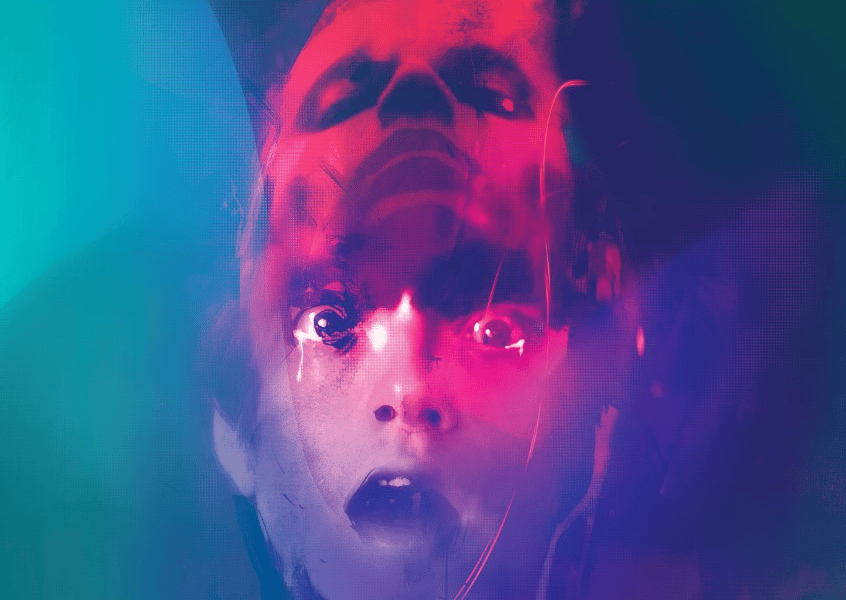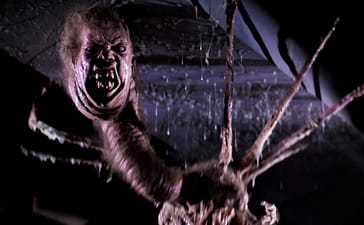If you imagine a dark and horrifying take on the old Rik Mayall vehicle Drop Dead Fred, you’re kind of in the right ballpark when it comes to conceptualising Daniel Isn’t Real, the second feature film from director and co-writer (with Brian DeLeeuw) Adam Egypt Mortimer.
Like that film, this one also centres on a troubled adult dealing with the reemergence of their childhood “imaginary” friend, ready to wreak havoc on what passes for their life. Unlike Fred, Daniel is far from benign. Mayall’s Fred brought kindness in the form of chaos, forcing Phoebe Cates’ dowdy Lizzie to take control of her own life. Here, the titular Daniel (Patrick Schwarzenegger) seems at first to be a positive force in the life of Luke (Miles Robbins), a troubled young man dealing with a raft of personal problems, imbuing him with confidence and charm. Inevitably, things soon take a sinister turn.
Which we should see coming, frankly. Daniel’s first emergence in Luke’s childhood, shortly after the latter witnessed a horrific act of street violence, eventually resulted in the attempted poisoning of Luke’s mother (Mary Stuart Masterson). As a result, she had him ritualistically “seal” Daniel in an old dollhouse, a bit of “play as discipline” business that seems to do the trick until present day traumas see Daniel, suave and suited like a young Patrick Bateman, slide once more beneath the surface of Luke’s life like a shark under a paddling swimmer. The only ripples are Luke’s own reactions to Daniel’s actions and words – after all, only he can see him, and since he’s already in therapy for a raft of issues, he’s not a hundred percent sure as to the “reality” of Daniel’s existence.
“…a nigh-perfect calling card film that should see Mortimer and co. working on a much bigger canvas before too long.”
We’ve danced this dance before, everywhere from Fight Club to the recent Amazon re-imagining of The Tick (and do check that one out) and part of the fun is trying to parse what is objectively real and what is only subjectively so – a task made deliberately difficult by how closely the film cleaves to Luke’s increasingly erratic point of view. Mental illness or malign spirit? From a genre point of view, either answer could be satisfactory, and the film weights the former possibility, lumbering Luke with a mad mother, a sympathetic but probing psychiatrist, and a number of other “boy ain’t right” signifiers before inevitably leaning towards the other possibility.
It’s in these sequences that Daniel Isn’t Real really sings. Mortimer and his team might be building a cerebral puzzle for us, but they’re also not afraid to go for splatter when it matters, indulging in a visual palette that hearkens back to both Adrian Lyne’s cult classic Jacob’s Ladder and your better Clive Barker and Barker-adjacent offerings. Here be body horror of the most imaginative kind, although it’d spoil the fun in describing it – suffice to say there’s more than one “holy shit!” moment that lands with tremendous effect, even if the budget occasionally strains at the seams trying to encompass the conceptual ambition.
Strong performances abound, especially from Schwarzenegger, who exudes dangerous charm every second he’s on screen, and American Honey’s Sasha Lane in what could have been a pretty thankless “imperiled love interest” role, and the whole thing unfurls at an impressive deliberate, but not ponderous, tempo, each morsel of new information dropped at precisely the right moment to elicit maximum audience impact. Daniel Isn’t Real is small in scale but big on ideas and atmosphere, a nigh-perfect calling card film that should see Mortimer and co. working on a much bigger canvas before too long.







